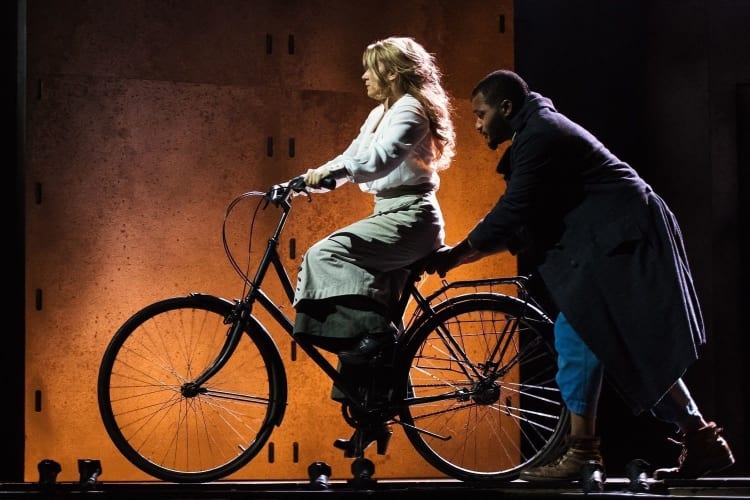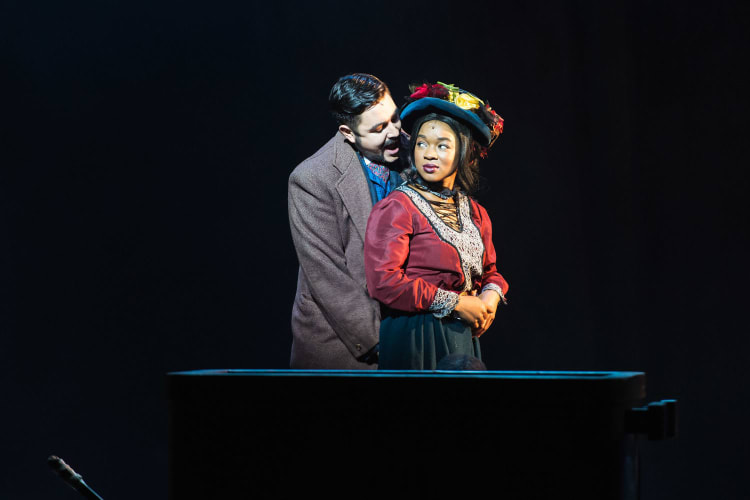Tiger Bay is the name by which the docks area of Cardiff has been historically known.
It was there that the world’s first £1 millon cheque was signed, in 1913, the docks being vital in the export of coal from the Valleys to the rest of the industrial world. The name also has mythic resonance, since the area is the home of one of Britain’s oldest multi-cultural communities, and the place where all sorts of good times could be guaranteed on a Saturday night.
It is this rich history which Tiger Bay is aiming to harness, it being an unashamed attempt to create a locally-rooted but universally appealing epic musical.
A co-production between the Wales Millennium Centre and frequent collaborators Cape Town Opera, the “out-of-town try-outs” were in South Africa earlier in the year. It arrives in Cardiff suitably modified, and boasting an array of talent from both nations (and others).
The set (designed by Anna Fleischle) is dominated by the bow of a mighty ship and, within the first few minutes, most of the elements of the multi-faceted story have been introduced. A man dressed as a wizard plays with a crystal ball; a younger man sneaks from the house of an African prostitute to meet his non-African girlfriend; meanwhile, the actual business of the docks goes on.
This is the transport of large handcarts full of coal to the ships, pushed by workers (donkeymen) along rails; their passage is eased by children, water boys, who grease the tracks. The workers are paid only if they transport sufficient numbers of carts. The physical labour aspect of Michael Williams’s story is conveyed rather effectively by directors Melly Still and Max Barton.
The meat of the story involves Dom Hartley-Harris’s grief-stricken Themba, who has arrived from Africa in order to build a new life. With the help of feisty orphan Ianto, he secures work as a donkeyman.
He also falls in with the local community of immigrants, at the bar run by Marisha—played by Suzanne Packer, who shows off a previously unsuspected singing voice—whose patrons include Luvo Rasemeni’s Fezile, Zolani Shangase’s Yusef (welcome even though he doesn’t drink rum) and Busisiwe Ngejane as Klondike Ellie, the afore-mentioned lady of easy virtue.
Needless to say, there is trouble ahead. The dockers' union, led by Ian Virgo’s Arwen, is in dispute with the management—the villainous Seamus O’Rourke played as a Cardiff “lad” with ideas above his station by Noel Sullivan; and they are also hostile to the idea of non-whites either joining them, or being used as strike-breakers (cue much comic use of the term “blackleg”).
And then there’s the immediate attraction between Themba and spirited shop-girl Rowena Pryddy (another migrant, this time from the Valleys), played by relative newcomer Vikki Bebb. Not to mention the discovery that Rowena’s fiancé, Boer War veteran O’Rourke, may have had some involvement in the unfortunate fate of Themba’s family.
The other main narrative element involves a heavily fictionalised Marquess of Bute—a powerhouse performance from West End veteran John Owen-Jones. Owner of the land on which the Docks are built, he is the richest man in the world. He is more concerned, however, with crystal-ball-gazing in order to discover the fate of his son; a venture in which he is assisted by O’Rourke, and London clairvoyant Leonora Piper (an imposing Liz May Brice).
And then are the water boys (young performers drawn from the local community), who are a lively presence throughout, even as they are dragooned into a low-level naval academy on the pretext of being rescued from street-urchinry. There are even, fleetingly, suffragettes.
Daf James’s score and melodies are as impressive as we have come to expect from him in recent years, aiming for the Euro-classical majesty of Les Misérables rather than Broadway smoothness. The ensemble is also well served by choreographers Melody Squire and Lungelo Ngamlana, who inject welcome notes of African-ness here and there.
Williams’s story-telling is fluent, and the odd cheesy lyric (e.g. “harbourmaster of my heart”) can be forgiven. Despite a clever twist, however, the mystical, “above-stairs” element of the tale is not as coherent or satisfying as the street-level drama; although the moment at which The Marquess and Themba are both seen mourning their lost children is a striking one.
Ngejane, Hartley-Harris and Bebb in particular give stellar performances, and whichever of Louise Harvey and Ruby Llewelyn played Ianto on press night also deservedly received much love from the packed auditorium.
There are gritty and tragic elements to the stories told in Tiger Bay, and there are a few false notes. One does leave the theatre, however, having been thoroughly entertained by professionals at the top of their game.


